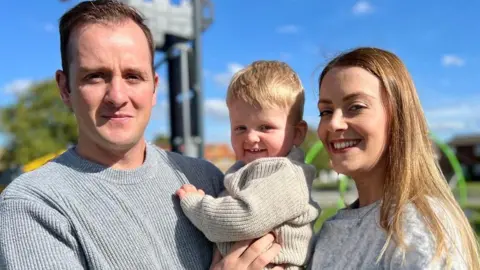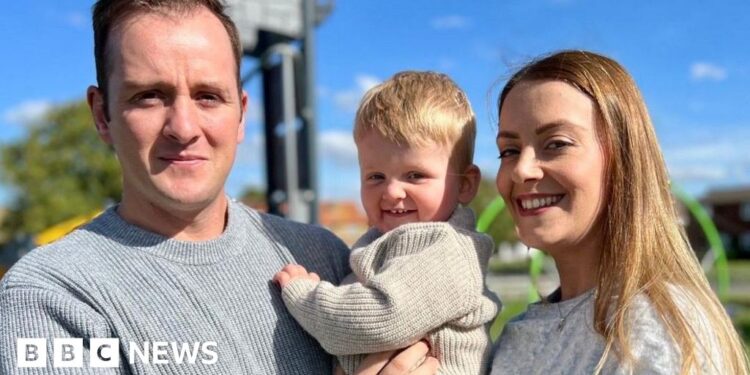Kirsteen O’Sullivan, Windsor
 BBC
BBCA mother has spoken out about dealing with severe period pain for two decades before finally being diagnosed with endometriosis.
Reah Steer, 34, from Windsor in Berkshire, described enduring years of agony and being prescribed the contraceptive pill, which only disguised the disease.
The condition prevented her from becoming pregnant, leading her and her husband to undergo IVF treatment.
“Doctors need to listen more to women with severe period pain,” she said.
Endometriosis causes tissue, similar to the lining of the uterus, to grow elsewhere in the body, including the ovaries, pelvis, bladder and bowel.
It can cause extreme pelvic pain and can make it difficult to get pregnant.
According to the charity Endometriosis UK, it affects 1 in 10 women.
Ms Steer said she first experienced the symptoms when she was a teenager.
“I used to have heavy and painful periods. I’d have to go home from school because of it,” she said.
“I went on the contraceptive pill and that tended to mask a lot of my symptoms.”
She said it was only when she started to trying for a baby and was unable to get pregnant that her endometriosis, which had caused a cyst on her ovary, was discovered.
“I’d heard it mentioned before but I didn’t fully understand it at that point,” she said.
“It was good for it to have a name but annoying that it was stopping us from having a baby.”
‘More education’
Ms Steer and her husband Jono underwent IVF treatment and finally received the good news they had been hoping for, welcoming their baby son last year.
She said she still cannot comprehend why it took so long to find out what had been causing her pelvic pain.
“In this day and age it’s still shocking to me that we have to go through this,” she said.
“I think we need more education out there, starting in schools.
“We need to have those talks with the younger generation, so that they understand that it’s not normal to have periods that are so painful you can’t continue with your daily life.”
Ms Steer believes that many women are not listened to and are prescribed the pill for their pain, instead of health professionals investigating the cause.
She is encouraging women to be persistent until they’re listened to.
“The doctors need to listen more and not just say ‘right off you go, on the pill, that will be fine’,” she said.
“We need to have more treatments available, not just going on the pill or having surgery. That’s not good enough.”
Source link : https://www.bbc.com/news/articles/ckg6edk0yleo?at_medium=RSS&at_campaign=rss
Author :
Publish date : 2025-09-30 05:39:00
Copyright for syndicated content belongs to the linked Source.







